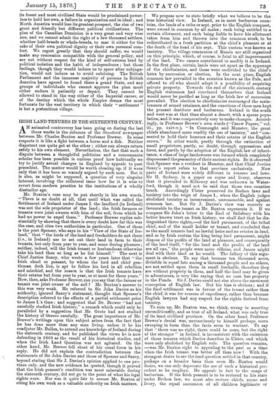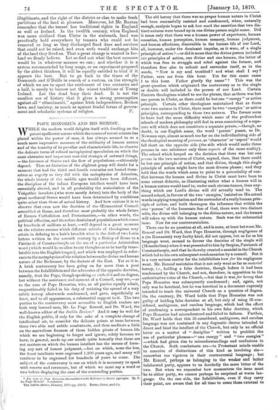IRISH LAND TENURES IN THE SIXTEENTH CENTURY.
AN animated controversy has been going on during the last three weeks in the columns of the Standard newspaper between Mr. Charles Buxton and Professor Brewer. In some respects it is like a fight between a horse and a fish. Neither disputant can quite get at the other ; either can always return safely to his own element. Nevertheless, the fact that such a dispute between a thoughtful politician and a consummate scholar has been possible is curious proof how habitually we try to justify aotual changes in England by appeals to past precedent. The matter would be worth clearing up, if it were only that it has been so warmly argued by such men. But it is also, as might be supposed, a question of very singular interest, involving the collateral issue how far it is wise to revert from modern practice to the institutions of a wholly dissimilar age.
Mr. Buxton's case may be put shortly in his own words. " There is no doubt at all, that until what was called the Settlement of Ireland under James L the landlord (in Ireland) was not the sole proprietor of the land ; the Irish farmers or tenants were joint owners with him of the soil, from which he had no power to expel them." Professor Brewer replies sub- stantially by showing that there is every doubt how far this was the case, and cites two authorities in particular. One of these is the poet Spenser, who says in his " View of the State of Ire- land," that " the lords of the land and freeholders do not there (i.e., in Ireland) use to set out their land in farm to their tenants, but only from year to year, and some during pleasure ; neither, indeed, will the Irish tenant or husbandman otherwise take his land than so long as he list himself." The next is Chief Justice Saxey, who wrote a few years later that " the Irish churl or peasant, by whom the lord and chief gen- tleman doth live, is apt to follow his lord in all rebellion and mischief, and the reason is that the Irish tenants have their estates but from year to year, or at most for three years." How, then, asks Professor Brewer, can you say that the farmer or tenant was joint owner of the soil ? Mr. Buxton's answer to this was very weak. He referred to Sir John Davies as his authority, ignored Saxey's statement, thought that Spenser's description referred to the effects of a partial settlement prior to James I.'s time ; and suggested that Dr. Brewer " had not carefully studied Irish history," a remark which could only be paralleled by a suggestion that Mr. Grote had not studied the history of Greece carefully. The great importance of Mr. Brewer's writings upon this subject arises from the fact that he has done more than any man living, unless it be his coadjutor Mr. Bullen, to extend our knowledge of Ireland during the sixteenth century, and he published the views he is now defending in 1868 as the result of his historical studies, and when the Irish Land Question was not agitated. On the other hand, Mr. Brewer fell short of his usual force in his reply. He did not explain the contradiction between the statements of Sir John Davies and those of Spenser and Saxey, beyond stating that Sir J. Davies's opinion applied to one pro- vince only, and the new evidence he quoted, though it proved that the Irish peasant's condition was most miserable during the sixteenth century, did not go to the point of what his legal rights were. Nor was it quite fair to accuse Mr. Buxton of citing his own work as a valuable authority on Irish matters. We propose now to state briefly what we believe to be the true historical view. In Ireland, as in most barbarous coun- tries, the lands of a tribe or Sept, prior to the English conquest, were owned in common by all males ; each being entitled to a certain allotment, and each being liable to have his allotment taken from him and thrown into the common stock, to be redistributed in a fresh partition at the chief's pleasure or at the death of the head of his sept. This custom was known as tanistry. The village communes of Russia are still organized on this principle, which, of course, is fatal to all improvement of the land. Two causes contributed to modify it in Ireland. In the first place, certain lands were set apart as the appanage of the chieftaincies, and these went undivided to the chief's heirs by succession or election, In the next place, English common law prevailed in the counties known as the Pale, and offered to all who should adopt it a possibility of acquiring private property. Towards the end of the sixteenth century English statesmen had convinced themselves that Ireland would never be pacified as long as the Irish law of succession prevailed. The election to chieftaincies encouraged the main- tenance of armed retainers, and the exactions of these men kept the peasant destitute and barbarous. Ireland in the south and west was at that time almost a desert, with a sparse popu- lation, and it was comparatively easy to make changes. Accord- ingly, in Professor Brewer's own words (" Carew Papers," vol. iii., pp. xxiv-v.), " In Connaught and Munster, the great chiefs abandoned more readily the use of tanistry," and " con- sented to hold their honours and their estates of the English crown." In other words, partly through the extinction of small proprietors, partly, no doubt, through oppressions and force, and partly by the adoption of the English law of inheri- tance, a class of large landowners was formed which completely dispossessed the peasantry of their ancient rights. Be it observed that Spenser was a resident in Munster, and that Chief Justice Saxey's report refers to that province exclusively. Now parts of Ireland were widely different in tenures and laws. Sir H. Sydney, in a paper on coyne and livery, observes that it prevailed in Kilkenny and was unknown in Water- ford, though it need not be said that those two counties touch. Accordingly Ulster preserved its Brehon laws and tanistry into the reign of James I., when the English judges abolished tanistry as inconvenient, unreasonable, and against common law. But Sir J. Davies's view was scarcely as favourable to the tenant as Mr. Buxton represents it. If we compare Sir John's letter to the Earl of Salisbury with his better known tract on Irish history, we shall find that he dis- tinguished three rights,—of the lord paramount, of the tribal chief, and of the small holder or tenant, and concluded that as the small tenants had no lawful heirs and no estates in land, and as by Irish custom the king being lord paramount, might dispose of the profits of the land at pleasure, and consequently of the land itself, " for the land and the profits of the land are all one," the people were mere villeins, and James might deal with their land as he would. The fallacy of this argu- ment is obvious. To say that because ten thousand acres, divisible in equal lots among a thousand people and no others, are not settled upon them in small freeholds, therefore they are without property in them, and half the land may be given to adventurers, is very like saying that no man has property in the Funds. Sir J. Davies could not rise above the narrowest conception of English law. But his bias is obvious ; and if the final settlement was in favour of the tenant rather than the chief, it was for reasons of expediency, rather than because English lawyers had any respect for the rights derived from tanistry.
To sum up, Mr. Buxton was, we think, wrong in asserting unconditionally, and as true of all Ireland, what was only true of its least civilized province. On the other hand, Professor Brewer's denial was, unconsciously to himself perhaps, more sweeping in form than the facts seem to warrant. To say that " there was no right, there could be none, but the right of the stronger " in Ireland, is inconsistent with the existence of those tenures which Davies describes in Ulster, and which were only abolished by English rule. The question remains, —was Mr. Buxton right in appealing to the past as a time when the Irish tenant was better off than now ? With the strongest desire to see the land question settled in that country, perhaps on a broader basis than even Mr. Buxton would desire, we can only deprecate the use of such a historical pre- cedent as he employs. He appeals in fact to the usage of barbarism. If the Irish peasant is to be restored to his state under Brehon law, we must also restore chiefs, coyne and livery, the equal succession of all children legitimate or
illegitimate, and the right of the district or clan to make fresh partitions of the land at pleasure. Moreover, let Mr. Bust= remember that the tenant has traditional rights in England as well as Ireland. In the twelfth century, when England• was more civilized than Ulster in the sixteenth, land was practically held everywhere by tenants who could not be removed so long as they discharged fixed dues and services that could not be raised, and even serfs would exchange bits of the land they lived on. That a great change is wanted in Ire- land we firmly believe. Let us find out what the best measure would be in whatever manner we can ; and whether it is a system recommended by long usage, or an experiment proposed by the ablest thinkers, it will be equally entitled to trial if it appears the best. But to go back to the times of the Desmonds and O'Neills in search of a custom, on the strength of which we are to upset the settlement of two centuries and a half, is surely to borrow not the wisest traditions of Young Ireland. Let the dead bury their dead. It is not the smallest use of history that it gives a strong presumption against all " rifaccimenti," against Irish independence, Brehon laws, and tanistry, as much as against feudal forms of govern-
ment and scholastic systems of religion. P.































 Previous page
Previous page